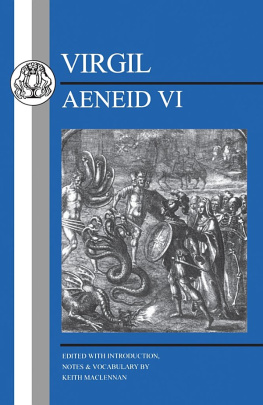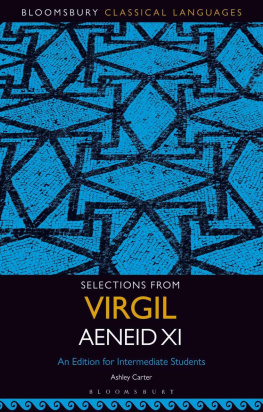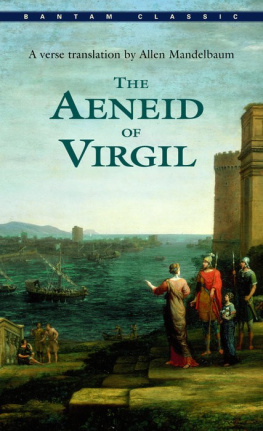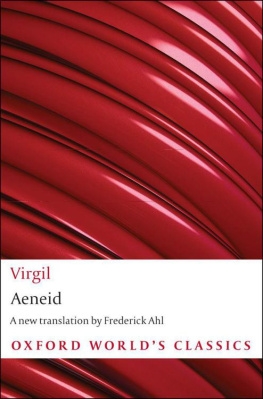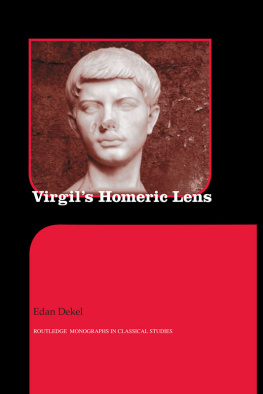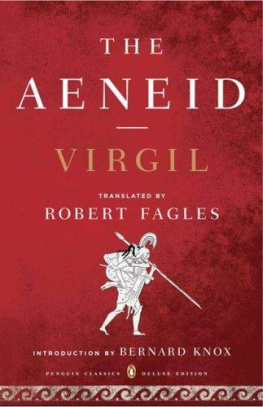Maclennan Keith - Virgil: Aeneid VI
Here you can read online Maclennan Keith - Virgil: Aeneid VI full text of the book (entire story) in english for free. Download pdf and epub, get meaning, cover and reviews about this ebook. City: London, year: 2016, publisher: Bloomsbury Academic, genre: Detective and thriller. Description of the work, (preface) as well as reviews are available. Best literature library LitArk.com created for fans of good reading and offers a wide selection of genres:
Romance novel
Science fiction
Adventure
Detective
Science
History
Home and family
Prose
Art
Politics
Computer
Non-fiction
Religion
Business
Children
Humor
Choose a favorite category and find really read worthwhile books. Enjoy immersion in the world of imagination, feel the emotions of the characters or learn something new for yourself, make an fascinating discovery.
- Book:Virgil: Aeneid VI
- Author:
- Publisher:Bloomsbury Academic
- Genre:
- Year:2016
- City:London
- Rating:5 / 5
- Favourites:Add to favourites
- Your mark:
- 100
- 1
- 2
- 3
- 4
- 5
Virgil: Aeneid VI: summary, description and annotation
We offer to read an annotation, description, summary or preface (depends on what the author of the book "Virgil: Aeneid VI" wrote himself). If you haven't found the necessary information about the book — write in the comments, we will try to find it.
Virgil: Aeneid VI — read online for free the complete book (whole text) full work
Below is the text of the book, divided by pages. System saving the place of the last page read, allows you to conveniently read the book "Virgil: Aeneid VI" online for free, without having to search again every time where you left off. Put a bookmark, and you can go to the page where you finished reading at any time.
Font size:
Interval:
Bookmark:

It is a very great honour to have been asked by John Betts to compose an edition of Aeneid VI, and quite a task to replace Gould and Whiteleys admirably straightforward and complete school version of 1946. As my reading list will show, I have approached the task from the timeless heart of the school classroom, and most of those who use this book as part of their teaching will be able to supplement extensively the scholarship upon which it is based. But I hope it will be of some service to those for whom it is intended, that is anyone who is coming to this text as one of the first passages of unaltered Latin he or she has read.
There cannot be many works of literature which offer more encouragement to go beyond themselves into other works which have inspired them or which they themselves have inspired. Homer, Dante, Milton, Purcell, Berlioz make an impressive assembly. Nor is it, these days, simply a matter of Dead White European Males. Cerberus makes his appearance in Harry Potter, and Philip Pullman has recreated brilliantly Virgils loca senta situ in The Amber Spyglass. May his readers come back to Virgil and enjoy seeing how Pullman has reLucretianised the anti-Lucretius of Virgils Elysian fields!
I have used the Austin / Mynors text, with some changes to the punctuation and the following different readings: 39 de more, 255 lumina, 495 vidit, 630 ducta, 900 litore. All consonant us have been changed to v, and all accusatives plural in -is to -es.
I have of course been assisted, cajoled, teased, entertained and extensively corrected by many helpers, among whom I must mention John Betts himself for encouraging me to get started, Judith Affleck and Ben Shaw who checked the first draft thoroughly, put me right in many matters and pointed me in several useful directions, but especially David West and James Morwood, both of whom I have been pestering for eighteen months with a few sensible and masses of outlandish ideas, all of which they have received patiently and with a sense of fun. John Penney has given very good advice on matters of language, and Edward Griffiths has offered an invaluable students-eye view of the first section of the notes.
Brampton, Carlisle | Keith Maclennan |
April 2003 |
1a. A few dates may create a context:
89 BCE: Rome captured by an invading army for the first time in 300 years but the army is a Roman army under Lucius Sulla. Sulla immediately withdraws until
83: Rome captured again by Sulla after a bloody battle beneath the walls.
70: Virgil born near Mantua in northern Italy.
64: Pompeius Magnus completes the conquest of Asia Minor and Syria and adds them to the Roman Empire.
58-51: Julius Caesar invades and conquers Gaul.
49-8: Civil war again. Pompeius defeated by Julius Caesar.
44: Julius Caesar murdered.
43: Authority in the Roman world divided between Caesars great-nephew Octavian, Mark Antony and Lepidus the triumvirs.
39 (approx): Virgils Eclogues published.
31: Competition and civil war between the triumvirs come to an end at the Battle of Actium when Octavian defeats Mark Antony and his ally Cleopatra Queen of Egypt.
30: Octavian invades Egypt, which becomes a province of the Roman Empire.
29: Virgils Georgics published.
27: Octavian given the title Augustus.
23: Death of Augustus nephew Marcellus (Aeneid 6.860-86)
19: Virgil dies; the unrevised Aeneid is published on Augustus orders.
These years cover the change in Rome from a republican form of government (competition for power between aristocrats decided by more or less free and open election) to the rule of the emperors. Augustus was the first of the emperors. The name Augustus is a title of honour, conferred in 27 BCE. Before that date we refer to him as Octavian, though he referred to himself as Caesar.
It is easy to find modern parallels for the insecurity and terror of the period.
1c. In 49, government finally collapsed into the civil war between Julius Caesar and Pompeius Magnus. Within a year Pompeius was defeated and murdered. In 44 Caesar himself was murdered, and there developed a struggle for power between the old aristocracy, Caesars political associate Mark Antony, Caesars great-nephew and heir Octavian, and Pompeius son Sextus. Slowly and with much violence this four-sided (even four is an over-simplification) contest resolved into a struggle between two men, Antony and Octavian, and in 31 this too was settled when Antony was defeated in the naval battle off Actium in Western Greece.
were brought into the programme, Virgil among them.
he entered the circle of C. Maecenas, one of Octavians closest colleagues, an astute politician and an energetic patron of the arts. Virgil subsequently dedicated the Georgics to Maecenas.
Finally Virgil set his mind to the grandest and most challenging task an ancient poet could undertake, the composition of an epic poem.
important contribution to the development of the hexameter metre in Latin.
Venus was Aeneas mother; Aeneas son was Ascanius, also called Iulus. Iulus founded Alba Longa and the line of kings from which Romulus was descended. Thus a line of descent could be traced connecting Venus, Aeneas, Romulus, the family of Julius Caesar and hence Augustus himself.
The event looks forward to Augustus, who could not save from death his adoptive father Julius Caesar, but based his claim to authority on the pietas with which he avenged his murder.
Introductory note: Virgil assumes that we are familiar with the story of the Trojan war: how Paris, son of King Priam of Troy, took Helen from her husband Menelaus king of Sparta; how Menelaus with his elder and mightier brother Agamemnon led an expedition of the greatest Greek leaders to recover Helen; how the siege of Troy lasted ten years and ended only after Achilles, the greatest of the Greeks, had killed Hector, the greatest of the Trojans, and then been killed himself by Paris. The fall of Troy itself is described from Aeneas own point of view in Book 2.
Scattered through this summary are passages in italics: these give a very few illustrations of Virgils use of the Homeric epics.
Book 1. The poet introduces the theme: the story of how war and heroism led, in spite of the hostility of Juno, to the foundation of Rome. We first meet Aeneas and the Trojans sailing from Sicily on what ought to be the last leg of their journey to Italy. Juno raises a storm which wrecks some of Aeneas ships, separates the rest from each other, and drives Aeneas with seven of them to the coast of Africa. (Odyssey 10: Odysseus is within sight of home when a storm drives him back into the unknown.) While Aeneas rests here, overcome by despair, his mother Venus protests in heaven to Jupiter that Juno is permitted to interfere with her sons destiny, which is the foundation of Rome. (Odyssey 5: Odysseus patron-goddess Athena protests to Zeus that Odysseus is being kept away from home.) Jupiter responds with a great prophecy looking forward to the triumphs of Aeneas descendant Augustus. Aeneas is now guided by Venus to Carthage, recently founded by Queen Dido, a refugee from Tyre, and still being built. There he finds that the friends whom he thought wrecked have made their way to Carthage and are being welcomed by Dido. Dido, seeing in him a fellow-exile, offers him and the Trojans partnership in Carthage. She invites them all to a great feast.
Next pageFont size:
Interval:
Bookmark:
Similar books «Virgil: Aeneid VI»
Look at similar books to Virgil: Aeneid VI. We have selected literature similar in name and meaning in the hope of providing readers with more options to find new, interesting, not yet read works.
Discussion, reviews of the book Virgil: Aeneid VI and just readers' own opinions. Leave your comments, write what you think about the work, its meaning or the main characters. Specify what exactly you liked and what you didn't like, and why you think so.

